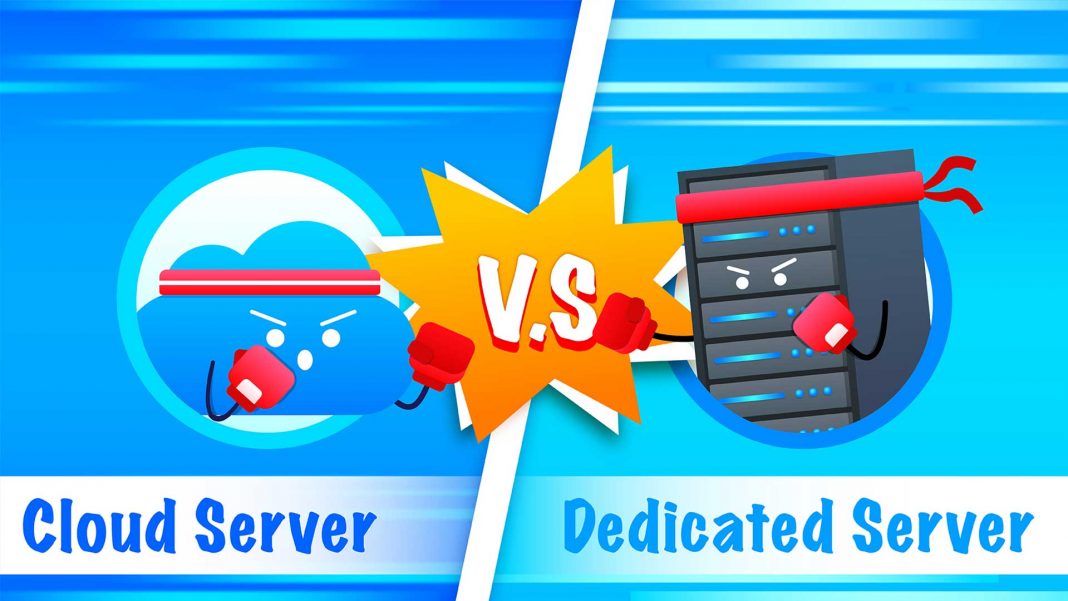Since servers have joined the business world, they have helped organizations to accomplish their goals with ease. Presently, computing is not only a demand, but it has become a need for business entities. With countless advantages, servers are ideal for data sharing and offering computation for clients. Therefore, you must choose wisely. However, deciding whether to go for a cloud server vs dedicated server is an important task for your business. A correct judgment can take your firm towards success, whereas, any mistake can disturb your operational structure.
Cloud Server
In the simplest explanation, a cloud server is created, hosted, and managed with the help of a specific cloud computing program on the internet. It’s a powerful virtual or physical infrastructure that stores essential data.
It is created through virtualization software that creates multiple virtual servers by dividing a physical server. It helps businesses to store information with an ‘Infrastructure-as-a-Service’ or IaaS model, so the data can be accessed remotely from any online device or interface.
Dedicated Server
A dedicated server is a single source (computer) where all the information is stored. There is no interference with virtual technology, and all the data is isolated in a single device. In other words, dedicated hosting provides a complete grip to users over the server’s infrastructure.
So, these servers are entirely dependent on the hardware to ensure industry-leading permanence, speed, performance, and most essentially, reliability. Furthermore, dedicated servers are also utilized to manage smooth communication between all the devices or computers present on a single network.
Through a dedicated server, users have the power to opt for the operating system of their choice. Service providers are always there to recommend the most suitable OS as per the nature of business. This is why the users have complete liberty to ignore ‘noisy neighbour’ problems because of the shared infrastructure. Moreover, they can always rely on the providers to tune or replace the hardware or software according to their needs.
Comparison – Cloud Server vs Dedicated Server
Both cloud and dedicated servers have their own usages, and both of them are necessary for businesses. Nevertheless, it is vital to figure out your reasons for choosing any particular server. So, if you are confused and not sure which server could serve your business needs in a better way?
Then below are all the major, but important points you must keep in your mind before knowing the authentic server for your business.
1. Performance
Dedicated servers are always the first choice of businesses, which are looking for quick recovery and processing of the data. It is because the information is stored locally; therefore, not much time is required for information retrieval. And due to fast performance, dedicated computing is mostly found in e-commerce organizations, as every second is essential for the growth of such firms.
Cloud servers have to pass through the Storage Area Network (SAN) to approach data, which is traversed along the infrastructure’s back end. Also, the request passes through the hypervisor, which is why it delays the information retrieval process as compared to dedicated servers.
2. Storage Expansion and Contraction
In dedicated servers, there are limits to physical hardware due to Distributed Antenna System (DAS) arrays. So there can be a possibility of adding a new drive to an existing array with the help of an allied battery, a RAID controller, and LVM (Logical Volume Manager) filesystem.
However, it can be difficult to expand or contract the storage in a dedicated solution, as it takes numerous efforts and supporting equipment to do the job. However, changes in the storage capacity become simple if the server provider has a great technical background.
But when it comes to cloud servers, you can enlarge and reduce storage as per your business needs. You don’t have to look for external drives or any supporting hardware for storing the data. Moreover, unlike dedicated servers, you can enjoy managing the space without downtime.
3. Migration
A change in trend, technology, or nature of your business may force you to switch servers. There are multiple factors for server migration, such as security concerns or changes in equipment. Therefore, flexibility in a server is mandatory for organizations, as there can be alterations in business strategies from time to time.
So whether you opt for a dedicated server or you simply cloud server your business, persistent migration is possible in either way. However, on selecting a dedicated server, make sure you plan for longer periods as storage factors may give you a little hard time.
4. Cost
Every server has a different cost. So it is you who has to make the right decision. When talking about the cloud servers, then they are budget-friendly in the beginning in contrast to dedicated servers.
But with time, as your business expands and demands more storage, cloud servers may need more investment. As cloud servers are managed by cloud providers, so you are billed with service fees and other expenses on a monthly or annual basis.
On the other hand, dedicated servers can be upgraded on minimum expenditure. You may want to add network cards, NVMe (Non-Volatile Memory) disks, and memory to the main source to enhance capabilities. But it would be a one-time investment, which can cover several business years.
So if you have decided to go for the dedicated servers, make sure you look for the providers who offer several plans. Remember! Authentic dedicated services are those which have a variety of options for their customers. So as a user, you can pick the best plan with great features, such as Anti-DDoS Protection, Hardware, and Network Uptime, and many more, within your budget.
5. Management
Servers aren’t easy to handle, especially if your business is in a growing position. You have to assure the strength and financial position of the company before selecting a server for successful daily functions on an everyday basis.
Dedicated servers need proper management and administration. This is why you must seek providers who have a proper team.
These servers must be backed by the responsible people for its management to tackle any unfavourable condition right on the spot. And no one but an experienced dedicated server provider is required to assure everything is on the right track. Coordination with the team is necessary because they possess profound knowledge of data storage and other server operations.
Meanwhile, cloud servers can be easily supervised. In the case of any mishap, cloud providers are always there to combat any major server problem. This factor is really a time and resource saver for your company. You may not require having high-knowledge IT staff. Hence, your business can flourish more, as substantial costs are preserved.
6. Customization
Customization is one of the major advantages of a dedicated server. It permits you to tailor the server according to new business challenges. Unfortunately, customization is absent in the cloud environment; therefore, you are bound to limits.
7. Tools Availability
One great benefit of cloud servers is access to numerous tools for monitoring and management. And there are dozens of ways to do it. On the contrary, dedicated servers lack such facilities, as administration needs manual concentration.
8. Security
Servers are full of vital information and data of customers and companies, so they need rigid security all the time. It is important to remember that not only physical theft can tear your business apart, but even cybercriminals can damage your organization.
Data breach and malware threats can be avoided if your business is running on a powerful server. Luckily, both dedicated and cloud servers ensure data security. Nevertheless, dedicated servers are single-tenant while cloud servers are multi-tenant.
The former is used to serve a single client, whereas, the later allows multiple users to share resources in a private cloud where every tenant’s data is unseen to other tenants.
So, it solely depends on your organization’s security structure that would help you decide using single-tenant or multi-tenant protection.
Cloud Server vs. Dedicated Server – Pros and Cons Overview
Cloud Server – Major Benefits
Cloud servers save a lot of business expenses. Also, they don’t need any extra supervision. With the ease of expansion, cloud servers walk step by step with your everyday business needs. The provision of high-level security is what makes this server a prominent one from the rest of the competition.
Cloud Server – Major Drawbacks
Cloud servers can be expensive due to the scalability factor. Besides, you have to pay monthly or yearly payments to the providers.
Dedicated Server – Major Benefits
Dedicated servers offer limited sharing of server resources. It provides a unique IP address that helps your business in several ways. Furthermore, there are no hidden charges or fee, all you need is equipment within your official premises.
Another great benefit of a dedicated server is the ease of administration. All you need is to choose a suitable plan, and let the service providers do the magic. Yes! They are responsible for setup, hardware replacement, installation, configuration, and everything else.
Dedicated Server – Major Drawbacks
The major drawback of a dedicated environment is that you may have to bear the leasing cost for these servers, which can higher as compared to the server equipment.
Suggestions
Both servers, cloud and dedicated, have great advantages and pitfalls. Therefore, choosing the best server for business is entirely your decision to make. It is your responsibility to analyze the purpose and vision of your organization as it will help you in making the right choice.
Cloud server versus the dedicated servers! Which can serve your business in the best possible way? Surely, it’s an important question that needs a perfect answer, as both servers are actively taking organizations to the next level. But if you are bewildered about choosing a server for your business, then Net Onboard is here to help you make the right move.























